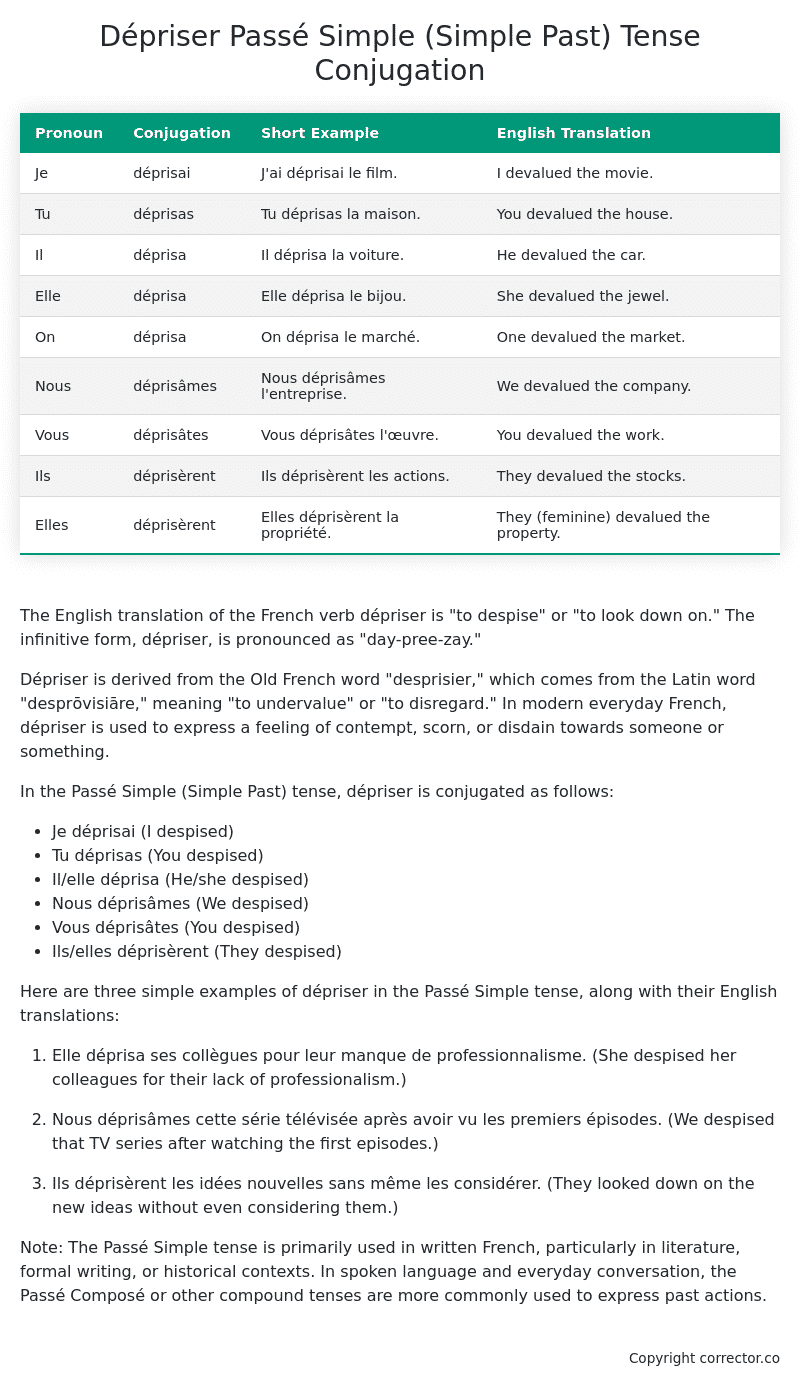Passé Simple (Simple Past) Tense Conjugation of the French Verb dépriser
Introduction to the verb dépriser
The English translation of the French verb dépriser is “to despise” or “to look down on.” The infinitive form, dépriser, is pronounced as “day-pree-zay.”
Dépriser is derived from the Old French word “desprisier,” which comes from the Latin word “desprōvisiāre,” meaning “to undervalue” or “to disregard.” In modern everyday French, dépriser is used to express a feeling of contempt, scorn, or disdain towards someone or something.
In the Passé Simple (Simple Past) tense, dépriser is conjugated as follows:
- Je déprisai (I despised)
- Tu déprisas (You despised)
- Il/elle déprisa (He/she despised)
- Nous déprisâmes (We despised)
- Vous déprisâtes (You despised)
- Ils/elles déprisèrent (They despised)
Here are three simple examples of dépriser in the Passé Simple tense, along with their English translations:
-
Elle déprisa ses collègues pour leur manque de professionnalisme.
(She despised her colleagues for their lack of professionalism.) -
Nous déprisâmes cette série télévisée après avoir vu les premiers épisodes.
(We despised that TV series after watching the first episodes.) -
Ils déprisèrent les idées nouvelles sans même les considérer.
(They looked down on the new ideas without even considering them.)
Note: The Passé Simple tense is primarily used in written French, particularly in literature, formal writing, or historical contexts. In spoken language and everyday conversation, the Passé Composé or other compound tenses are more commonly used to express past actions.
Table of the Passé Simple (Simple Past) Tense Conjugation of dépriser
| Pronoun | Conjugation | Short Example | English Translation |
|---|---|---|---|
| Je | déprisai | J’ai déprisai le film. | I devalued the movie. |
| Tu | déprisas | Tu déprisas la maison. | You devalued the house. |
| Il | déprisa | Il déprisa la voiture. | He devalued the car. |
| Elle | déprisa | Elle déprisa le bijou. | She devalued the jewel. |
| On | déprisa | On déprisa le marché. | One devalued the market. |
| Nous | déprisâmes | Nous déprisâmes l’entreprise. | We devalued the company. |
| Vous | déprisâtes | Vous déprisâtes l’œuvre. | You devalued the work. |
| Ils | déprisèrent | Ils déprisèrent les actions. | They devalued the stocks. |
| Elles | déprisèrent | Elles déprisèrent la propriété. | They (feminine) devalued the property. |
Other Conjugations for Dépriser.
Le Present (Present Tense) Conjugation of the French Verb dépriser
Imparfait (Imperfect) Tense Conjugation of the French Verb dépriser
Passé Simple (Simple Past) Tense Conjugation of the French Verb dépriser (You’re reading it right now!)
Passé Composé (Present Perfect) Tense Conjugation of the French Verb dépriser
Futur Simple (Simple Future) Tense Conjugation of the French Verb dépriser
Futur Proche (Near Future) Tense Conjugation of the French Verb dépriser
Plus-que-parfait (Pluperfect) Tense Conjugation of the French Verb dépriser
Passé Antérieur (Past Anterior) Tense Conjugation of the French Verb dépriser
Futur Antérieur (Future Anterior) Tense Conjugation of the French Verb dépriser
Subjonctif Présent (Subjunctive Present) Tense Conjugation of the French Verb dépriser
Subjonctif Passé (Subjunctive Past) Tense Conjugation of the French Verb dépriser
Subjonctif Imparfait (Subjunctive Imperfect) Tense Conjugation of the French Verb dépriser
Subjonctif Plus-que-parfait (Subjunctive Pluperfect) Tense Conjugation of the French Verb dépriser
Conditionnel Présent (Conditional Present) Tense Conjugation of the French Verb dépriser
Conditionnel Passé (Conditional Past) Tense Conjugation of the French Verb dépriser
Conditionnel Passé II (Conditional Past II) Tense Conjugation of the French Verb dépriser
L’impératif Présent (Imperative Present) Tense Conjugation of the French Verb dépriser
L’impératif Passé (Imperative Past) Tense Conjugation of the French Verb dépriser
L’infinitif Présent (Infinitive Present) Tense Conjugation of the French Verb dépriser
L’infinitif Passé (Infinitive Past) Tense Conjugation of the French Verb dépriser
Le Participe Présent (Present Participle) Tense Conjugation of the French Verb dépriser
Le Participe Passé (Past Participle) Tense Conjugation of the French Verb dépriser
Struggling with French verbs or the language in general? Why not use our free French Grammar Checker – no registration required!
Get a FREE Download Study Sheet of this Conjugation 🔥
Simply right click the image below, click “save image” and get your free reference for the dépriser Passé Simple tense conjugation!

Dépriser – About the French Passé Simple (Simple Past) Tense
Formation
Usage
Narration
Historical Context
Interactions with other tenses
Passé Composé
Imparfait
Conditional and Subjunctive
Summary
I hope you enjoyed this article on the verb dépriser. Still in a learning mood? Check out another TOTALLY random French verb conjugation!


